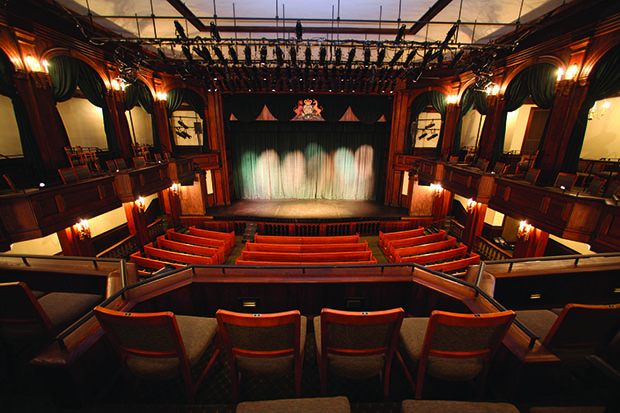The Stage is Set
05 Jan 2022
The Dock Street Theatre is inspiring the next generation of theatre-goers
By Brian Sherman

The Dock Street Theatre set the stage for Charleston’s foray into the world of the performing arts, opening its doors in 1736 as the first building in the United States constructed specifically to serve as a venue for dramatic and musical performances.
While the original structure, which hosted the first opera in America, is long gone—likely brought to the ground by a fire that ravaged the city in 1740—its legacy lives on in a restored three-story brick building near the intersection of Church and Queen streets.
Today, the Dock Street Theatre is owned by the City of Charleston and is the home of Charleston Stage, a non-profit established in 1978 by playwright, director, designer and educator Julian Wiles.
The largest professional company in residence in the Palmetto State, Charleston Stage’s 33 actors, dancers, singers and musicians on staff are dedicated to their craft and enhancing the experience of theater for school-age children across the Lowcountry.
The Dock Street Theatre had several transformations from its origins at the corner of Church and Dock Street—hence the name—but has always maintained its position as an icon in a city of icons.
The Planter’s Hotel rose out of the ashes in the early 19th century. According to the National Parks Service, the hotel was used extensively by planters from the midlands of South Carolina who traveled to Charleston during horse-racing season.
The Planter’s Hotel claimed its own piece of Southern history: Robert Smalls, a former slave and Civil War hero, was a waiter in the hotel’s dining room.
The hotel was about to be torn down in 1937 when the federal government’s Works Progress Administration stepped in and remodeled the building behind the hotel back to a theatre, with a stage and auditorium characteristic of the 18th century design that included a grand staircase off the lobby. It was listed on the National Register of Historic Places in 1973.
The theatre’s latest grand opening came in 2010, following a three-year, $19-million renovation project that kept many of the original elements, including a grand staircase off the lobby and the handsome wooden box seats on the second floor. The restored Dock Street Theatre reopened in May 2010 with a Spoleto Festival performance of "Flora," a recreation of the first opera ever performed in the American Colonies at that very location.
“The Dock Street Theatre is the jewel in the artistic crown of Charleston,” Wiles said.
A Welcomed Return for Audiences
A welcomed return after 19 months of being shut down during the pandemic, the Dock Street Theatre reopened last fall and welcomed a full house – 463 people.
On the schedule for Feb. 9 through Feb. 22 is “Murder on the Orient Express,” an adaptation of the Agatha Christie novel—a “screwball comedy,” according to Wiles, who is directing the show.
Wiles pointed out that the performance, adapted for the stage by Ken Ludwig, will require a couple of train cars on stage.
The Dock Street Theatre plans to return safely to its previous full schedule with Charleston Stage presenting around 160 performances a year and sharing the building with the Spoleto Festival USA, the MOJA Arts Festival, the Charleston Symphony, PURE Theatre and the Charleston Literary Festival.
“The Dock Street Theatre is the heart and soul of so many performances in the city. It’s probably one of the most used theatres in the country. The range of what is produced, from big musicals to serious dramas to classics like ‘A Christmas Carol,’ is exciting. It’s great for a city of our size to have this venue.”
Inspiring the next generation of performers
Wiles, who grew up on a farm in Fort Motte, South Carolina, landed in Charleston for good in 1978 after earning a master’s in dramatic art at the University of North Carolina.
The College of Charleston graduate worked at a summer camp on Johns Island which inspired him to pass along the love of performing arts to schoolchildren.
Education programs and community outreach are a big part of Charleston Stage. Wiles says that programs are modeled after those at the Young Vic Theatre in London and the Children’s Theatre Company in Minneapolis.
Charleston Stage’s outreach efforts are introducing hundreds of elementary, middle school and high school students to the performing arts.
In addition to summer camps and summer classes, around 350 kids take classes taught by 10 professional actors at Charleston Stage’s sister location, West Ashley Theatre Center on Sam Rittenberg Boulevard.
Before the pandemic, Charleston Stage was bringing around 20,000 students a year to the Dock Street Theatre to view live performances and well as bringing road productions to underserved elementary schools.
There’s also a high school apprentice program where kids learn about scenery, costumes, sound, lighting, and, of course, acting.
“We want them to be part of something creative as part of growing up,” Wiles said.
For more information on Charleston Stage, visit www.charlestonstage.com.












